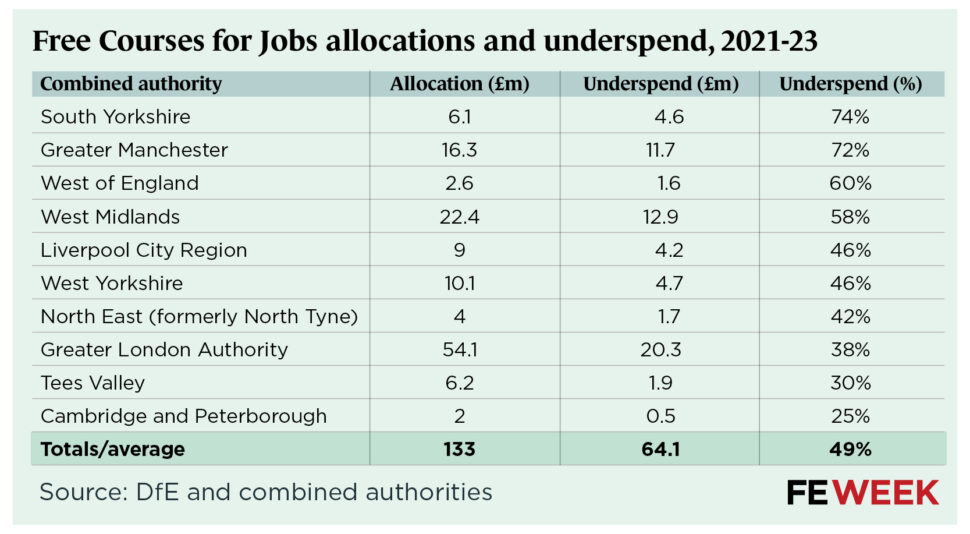More than 100 college leaders used a new mental health and wellbeing service which offers confidential sessions with an expert, according to the FE commissioner.
Shelagh Legrave’s final annual report as FE commissioner, published on Thursday, revealed 118 leaders took part in a government-funded professional supervision service from its launch in April 2023 until July 2024.
Legrave’s report covered her work for the 2023-24 academic year. Over that time, four colleges and one local authority triggered intervention from the FE commissioner, and seven were removed.
As of July 2024, nine colleges were in intervention, down from a reported 15 at the same point last year.
Legrave, whose term as FE commissioner ends this September, praised “welcome announcements” on funding for colleges over the reporting period, such as the £300 million announced in the autumn Budget, the FE capital transformation fund and “generous” incentives for new teachers.
However, “there remain a number of challenges,” Legrave said.
“The first is attracting and retaining teaching staff in a very tight labour market and where pay differentials can be significant between different educational institutions.”
Restrictions on commercial borrowing following the college sector’s reclassification to the public sector in 2022 “continue to be a real challenge”, particularly for colleges requiring development on their estates due to rising student numbers.
Here’s what we learned from the annual report.
Leader wellbeing
Among programmes listed in the report was the first full year of the FE leaders professional supervision service.
The service, offered by education mental health charity Education Support, was extended from schools to colleges following research indicating a “high proportion” of principals experienced stress on a “frequent basis”.
Principals, chief executives, deputies and other senior leaders can access the service, which requires them to commit to six confidential sessions of “professional supervision” with a qualified expert.
Legrave reported that since its launch, 118 leaders have accessed the service, with 97 per cent of those reporting they found it beneficial and would recommend it to colleagues.
Intervention
Two colleges were placed in intervention over the reporting period for triggering the FE commissioner’s financial control measures, one for its poor financial health and another for “failing to progress issues of concern”.
The report doesn’t name the colleges or the precise reasons for entering intervention.
A delayed report on Lakes College, published in October but dated June, said it needed an emergency government loan to alleviate short-term cashflow pressures.
Accessing emergency government funding is a trigger for intervention.
Weston College was also placed in intervention last year. The college was handed a financial notice to improve following revelations from government counter-fraud investigators of “historical failures of financial controls and a failure to disclose certain financial information”.
The college’s long-standing chair was replaced by Tim Jackson, one of the FE commissioner’s advisers.
Several high-profile intervention cases came to an end during the reporting year.
City of Wolverhampton College had its financial notice to improve finally withdrawn in April after 12 years.
Hull College, Cornwall College Group and Moulton College were also among those that finally exited intervention. Hull was in intervention for seven years, Cornwall was in financial intervention for eight and Moulton for seven.
Legrave’s report said: “Neither the FE commissioner nor DfE want colleges to remain in intervention for longer than is necessary.”
After their exit, colleges are placed in what’s called post-intervention monitoring and support (PIMS). According to the report, five of the seven colleges that exited intervention were placed in PIMS and another college was monitored following a merger.
Active support
One popular offer from the commissioner’s team is the curriculum efficiency and financial support programme.
There was “high demand” for the service, according to Legrave, which supports colleges to cost their curriculum plans. A total of 54 colleges accessed the scheme in 2023-24, up from 35 the year before.
Despite being available to any college, only six took part in free, two-day ‘health checks’ with the FE commissioner team. The checks give colleges feedback on their financial and curriculum plans, with the option to request further support from the team.
Another new programme reported on was the further education leadership mentoring scheme, which aims to “create a stronger, more diverse pipeline to the most senior roles in the further education sector”.
Over the 2023-24 academic year, 64 individuals received mentoring from one of 24 “highly skilled” former college leaders.
The report states 15 per cent of places on the programme are reserved for people with disabilities and people from ethnic minorities, groups which are underrepresented in college leadership roles. However, it doesn’t report on how many people from those groups have accessed the scheme and achieved leadership positions.




